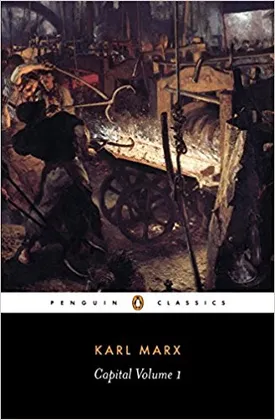Capital: Volume 1: A Critique of Political Economy by Karl Marx
Karl Marx’s magnum opus Capital: Volume 1: A Critique of Political Economy is widely regarded as one of the most influential books ever written. Published in 1867, the book has profoundly shaped economic theory, not only in two centuries since its publication, but in multiple subsequent generations. It has had a lasting effect on politics, law, and ideology.
The book is sometimes referred to as "Das Kapital" and is a comprehensive critique of capitalist production. Marx sets out to show how the capitalist system is based on the exploitation of the worker in order to extract surplus value from them. In his now-famous formulation, he states that capitalists are driven by the need to increase their capital and that this leads to the creation of an ever-greater surplus of capital that can then be reinvested, creating a cycle of exploitation.
At its heart, Capital is an economic treatise, in which Marx lays out his theories on the labor theory of value, surplus value, and the laws of motion of capital. He sets out to prove that production under capitalism is characterized by the growth of capital, but at the same time, that this growth is not compensated by the worker and that thus, it leads to the deterioration of their conditions. Marx is thus a proponent of the labor theory of value, which holds that the actual value of a commodity is determined by the amount of labor that went into its production. He also argues that employers are able to extract surplus value from their workers, above and beyond what is necessary to cover their production costs, due to the unequal bargaining power between them and the workers.
Marx's critique of political economy is based on a historical materialist approach, arguing that the development of capitalist production is based on the exploitation of labor, the concentration of capital, and the alienation of labor power. This approach views history itself as being propelled by the clash between classes and by their relative control over the means of production. He argues that if the means of production are held by a single class, then their interests will inevitably shape the prevailing laws and relations of production, leading to an ever-increasing gap between the rich and the poor.
Marx's theories on the law of motion of capital, offered in volume one, were fundamental to his argument against the capitalist system. He believed, as many still do today, that as capital accumulates, it eventually reaches a point of saturation and is no longer capable of yielding additional surplus value. This then leads to the eventual collapse of the system, as the exploited classes can no longer generate sufficient additional value to sustain a further growth of capital.
Capital: Volume 1: A Critique of Political Economy is one of the most influential books in capitalist thought and has had a major impact on the theorizing of economics in the two centuries since its original publication. Through his in-depth analysis of the mechanisms of capital and its devastating effects on laborers, Marx developed a critique of political economy that remains as relevant today as it did during the 19th century.

